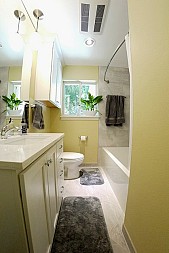Add an Electric Heater to Your Bathroom: Cozy and Cheap
 Kudos to you if you're trying to turn down your home thermostat a notch or two as the weather grows cooler. The result will be a win-win -- saving energy and reducing your utility bills. And it's not so hard to do ... should you get a bit chilly, you can always put on a sweater, right? Well, not always, actually. What about in the bathroom?
Kudos to you if you're trying to turn down your home thermostat a notch or two as the weather grows cooler. The result will be a win-win -- saving energy and reducing your utility bills. And it's not so hard to do ... should you get a bit chilly, you can always put on a sweater, right? Well, not always, actually. What about in the bathroom?
When you step out of the comfortably warm shower on a wintry morning, too low a room temperature can be quite a shock to your system. However, adding a simple electric heater to the "facilities" will keep you nice and cozy without skyrocketing your power consumption. Find out more.
Bathroom Heater Safety Tips
Let's start out with directions on how NOT to use a heater to stay safe in the bathroom:
- Do NOT ignore the manufacturer's instructions; they are there to help you install and use that particular model.
- Do NOT use a propane or kerosene heater indoors for any reason, unless you've got an emergency on your hands (and even then, you must ventilate the room extremely well) -- the risk of carbon monoxide poisoning is just too great.
- A portable electric space heater won't produce CO but still poses the risk of burns or electrocution, especially around water; do NOT use one in the bathroom.
- Do NOT fail to make sure that your heater is labeled for bathroom or outdoor use and that it is plugged only into an outlet equipped with a ground fault circuit interrupter (GFCI).
Types of Heaters
There are several common types of electric heaters that can be installed in your bathroom. The first is a radiant heater, which raises the temperature of the bathroom by means of electric coils or light bulbs. If it is combined with a fan, this type will provide near-instant heat, particularly in the small square footage of a typical bathroom. The second kind, a forced air heater, pushes warmed air into the bathroom. Third, an ultra-efficient infrared heat lamp mimics the sun's warming action. You will often find a heater as part of an exhaust vent combo, which may include a light as well.
Wattage Required
To calculate how much wattage you'll need, consider how big the room is and how efficiently it's insulated. For a moderately well insulated bath, figure on a heater of at least 10 watts per square foot of floor space when the heater is a supplement to your furnace. (However, if you have no other source of heat, change the formula to 15 watts per square foot.) This means that for a small to medium bathroom of up to 150 square feet, a 1500-watt ceiling- or wall-mounted heater should be plenty. If you have an oversized home spa-type bathroom, you'll need a more powerful heater.
Best Way to Mount the Bathroom Heater
You can hire an electrician to mount your electric heater on either the upper portion of the bathroom wall (safely out of reach of children) or for even more security, on the ceiling. Another advantage of the ceiling mount is that it frees up a larger amount of valuable wall space for shelving, mirrors, or artwork. The least hazardous placement of the "on/off" switch is on the wall outside the bathroom entrance. Of course, that means you need to remember to turn on the heat before you enter the bathroom itself. Alternatively, you might want to install a timer, which you can program to switch the heat on and off at the times you choose in advance.
Cost to Run a Bathroom Heater
To calculate the cost of running your heater for one hour, divide its wattage by 1000 and multiply by your local electric company's charge per kilowatt-hour. For example, at a rate of $.15 per kilowatt-hour, a 1500-watt heater would cost you 1500/1000 x $.15. That comes to 22.5 cents per hour, or less than four cents for 10 minutes' comfortable showering and drying time. Sounds like an affordable "luxury" indeed!
Laura Firszt writes for networx.com.
Updated January 29, 2018.
Looking for a Pro? Call us (866) 441-6648

Electrical Average Costs
Electricians Experiences

Replacement Of A Light Fixture That Literally Fell Off The Ceiling

Electrical Installation As Part Of A Living Room-to-Office Conversion



